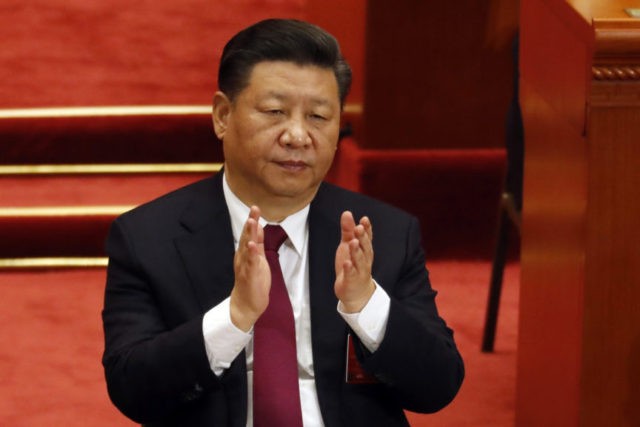China’s communist leader Xi Jinping looked back fondly upon his last five years of rule and urged the few politicians in China not a part of the Communist Party to “enhance confidence in the path, theory, system, and culture of socialism with Chinese characteristics” at an event Sunday.
China opened its National People’s Congress this week. Legislators—most members of the Communist Party of China (CPC)—are expected to repeal term limits on the presidency, allowing Xi to rule indefinitely. Xi is also the head of the Chinese People’s Liberation Army (PLA) and leader of the CPC; many consider “president” his weakest title.
China allows a small number of minority parties to exist, claiming this proves that the totalitarian regime still counts as a democracy. According to state-run news outlet Xinhua, Xi met with “political advisors from the China Democratic League and the China Zhi Gong Party, those without party affiliation and those from the sector of returned overseas Chinese” at his first Congress session event. At that meeting, Xi reportedly emphasized that Chinese totalitarianism was “a great contribution to political civilization of humanity” and congratulated himself on “five extraordinary years” of running China.
Xi told the group that the victories of his first five years “have been hard-won and are the result of the strong leadership of the party’s Central Committee,” which he leads, the South China Morning Post reported. As he addressed individuals who were not CPC members, however, he added that their existence demonstrated that the current Chinese regime “combines Marxist political party theories with China’s reality,” as opposed to “the old-fashioned party system which represents only a selective few or the vested interest.”
“The Chinese system is new, Xi said, because it unites all political parties and people without party affiliation toward a common goal, effectively preventing the flaws of the absence of oversight in one-party rule, or power rotation and nasty competition among multiple political parties,” Xinhua noted.
Xi reportedly concluded his remarks by urging non-communists to invest heavily in achieving communist goals. According to Xinhua, “Xi called on non-communist parties and people without party affiliation to enhance confidence in the path, theory, system, and culture of socialism with Chinese characteristics, consolidate political orientation and actively offer their suggestions.”
China Daily, another English-language Chinese state publication, added that Xi also rebuked critics of the one-party system by asserting that “China is not discarding democracy but forming wider and more effective democracy.”
“Under the Chinese system, all political parties and those without any party affiliation are united in striving for the same goals—avoiding such situations as a single party without supervision or the vicious competition and rotating governance inherent in other systems,” Xi reportedly said. “It is hoped that the non-Communist parties and those with no party affiliation will become good advisers, assistants and colleagues of the CPC.”
Chinese propaganda outlets often make the case that having one authoritarian party leading the nation is a significant improvement upon Western-style democratic republics, as it prevents political disagreement from allowing minority thinkers to get their way on a federal level. The Global Times, one of the more vocal Chinese state newspapers, regularly describes the American two-party system as “divided” and chaotic, incapable of producing change due to constant gridlock.
China uses this argument to sell the global left everything from Chinese military hegemony to global restrictions on free speech.
At this week’s National People’s Congress, the Communist Party and its minority allies will work to enact a series of reforms to Chinese government meant to consolidate Xi’s power, the most prominent among them the repeal of presidential term limits. The move appears unpopular enough in China that the regime’s internet censors have moved to ban a variety of words and phrases to prevent the outcry on social media platforms such as Weibo from getting international attention. Among the phrases that will get a post deleted are “I don’t agree” and “re-election.”
On the docket for the lawmakers this month are also other reforms that will grant Xi even more power, such as the federalizing of a robust “supervisory commission” corps meant to weed out “disciplinary” violations within the Communist Party. Since Xi took power in 2013, he has used nominally anti-corruption raids to detain and depose thousands of CPC officials and military leaders, effectively allowing Xi to eliminate any CPC member that may challenge his authority. Beijing launched a new round of disciplinary inspections on a local level last week.
The Congress will also vote on making “Xi Jinping Thought on Socialism with Chinese Characteristics for a New Era” part of China’s constitution. The Communist Party enshrined Xi in their constitution in October. The draft amendment on the national constitution began to circulate on Monday.

COMMENTS
Please let us know if you're having issues with commenting.